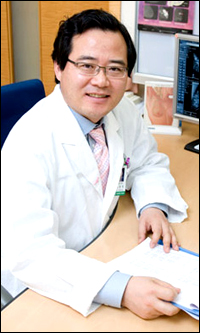 Breast cancer is the most common form of cancer diagnosed among Korean women. Roughly one out of 40 women are diagnosed with the disease, which made up 16.8 percent of all female cancer patients in 2002, according to government data.
Breast cancer is the most common form of cancer diagnosed among Korean women. Roughly one out of 40 women are diagnosed with the disease, which made up 16.8 percent of all female cancer patients in 2002, according to government data. Prof. Noh Dong-young of Seoul National University Hospital said Korean women are experiencing dramatic changes in their physiology, which are contributing to the increased cases of breast cancer, these changes include increases in height and breast size, earlier menstruation and later menopause.
Changes in lifestyle are also seen as contributing factors, with Korean females these days drinking and smoking more.
``Also they are having fewer children and are more reluctant to breastfeed them.`` he said.
Noh said that in comparison with the majority of females from other countries who contract breast cancer in their 50s and 60s, more Korean females get it in their 30s and 40s.
In the early days, breast cancer usually meant a woman had to ``give up her life as a female`` as the operation required the removal of the breast. However, Noh says now things have changed.
``We still believe that after a certain stage of cancer, removing the breast is the best way of treating the disease and preventing relapse. But if caught at a very early stage, we can save the basic shape of the breast and just remove the lump and surrounding tissue.`` he said.
He said in order to keep the shape of the breast as much as possible, regular medical checkups are crucial. ``Koreans are less aware of the disease and are less inclined to monitor it. Many women visit a hospital only after their husbands or masseuses tell them that they can feel a lump in their chest,`` he said.
``This form of cancer is considered one of the most curable. When found at an early stage, chances that you will survive for more than 10 years is 98 percent. However, if it spreads to other body organs the rate drops to 20 percent,'' he said. ``Those over 20 years old should do self-diagnose monthly and women in their mid-30s and older should visit a hospital to have mammograms once a year,`` he said.
Noh, a seasoned doctor performing more than 1,000 surgeries yearly, has adopted an image navigation system for the cancer. By monitoring the condition of the breast using a three-dimensional monitor, doctors can have a clear idea of what they are doing and can respond to the changing conditions of patients, Noh said.
He says Korea is one of the leaders in breast cancer surgery techniques. ``We still have a way to catch up with others regarding basic research, but our performance is far better.``
He is currently working on verifying the relations of certain forms of proteins causing breast cancer and how genetic factors affect the disease directly.
Professor Noh is respected not only for his operating skills, but also his caring attitude towards patients. He established the ``Venus'' group, a social gathering for those who have suffered from breast cancer, in 2000. He attends the meeting regularly to keep in touch with patients and advise them on how to prevent a relapse.
He comes to work at 7 a.m. everyday and answers ordinary patients' questions posted online. Everyday, more than five to six answers are updated on his website.
He is also involved in numerous charity groups related to the disease, including the famous Pink Ribbon events, such as marathons.
``Because breast cancer has one of the highest relapse rates, keeping an eye on patients and encouraging them to change their lifestyle is the most important form of treatment,`` he said.
A graduate of Seoul National University, he is a founding member of the Korea Breast Cancer Foundation, a member of the Korean Breast Cancer Society and several other academic societies
August 1, 2008

